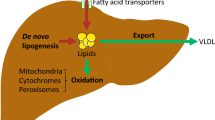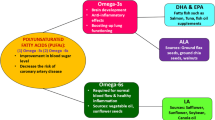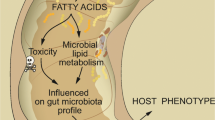Abstract
Recently, the pro-inflammatory effects of linoleic acid (LNA) have been re-examined. It is now becoming clear that relatively few studies have adequately assessed the effects of LNA, independent of obesity. The purpose of this work was to compare the effects of several fat-enriched but non-obesigenic diets on inflammation to provide a more accurate assessment of LNA’s ability to induce inflammation. Specifically, 8-week-old male C57Bl/6 mice were fed either saturated (SFA), monounsaturated (MUFA), LNA, or alpha-linolenic acid enriched diets (50 % Kcal from fat, 22 % wt/wt) for 4 weeks. Chow and high-fat, hyper-caloric diets were used as negative and positive controls, respectively. Expression of pro-inflammatory and pro-coagulant markers from epididymal fat, liver, and plasma were measured along with food intake and body weights. Mice fed the high SFA, MUFA, and high-fat diets exhibited increased pro-inflammatory markers in liver and adipose tissue; however, mice fed LNA for four weeks did not display significant changes in pro-inflammatory or pro-coagulant markers in epididymal fat, liver, or plasma. The present study demonstrates that LNA alone is insufficient to induce inflammation. Instead, it is more likely that hyper-caloric diets are responsible for diet-induced inflammation possibly due to adipose tissue remodeling.





Similar content being viewed by others
Abbreviations
- ALA:
-
Alpha-linolenic acid
- ARA:
-
Arachidonic acid
- CRP:
-
C-reactive protein
- CHD:
-
Coronary heart disease
- HF:
-
High-fat hyper-caloric
- IL-6:
-
Interleukin-6
- LT:
-
Leukotrienes
- LNA:
-
Linoleic acid
- MCP-1:
-
Monocyte chemoattractant protein-1
- MUFA:
-
Monounsaturated fatty acids
- MPO:
-
Myeloperoxidase
- 16:0:
-
Palmitic acid
- PG:
-
Prostaglandins
- POL2:
-
RNA polymerase II
- SFA:
-
Saturated fatty acid
- TX:
-
Thromboxanes
- TF:
-
Tissue factor
- TC:
-
Total cholesterol
- TAG:
-
Triacylglycerol
- TNF-α:
-
Tumor necrosis factor-alpha
References
Haslam DW, James WP (2005) Obesity. Lancet 366:1197–1209
P-c Chao, C-c Hsu, M-c Yin (2009) Anti-inflammatory and anti-coagulatory activities of caffeic acid and ellagic acid in cardiac tissue of diabetic mice. Nutr Metab 6:33
Dinarello CA (2000) Proinflammatory cytokines. Chest 118:503–508
Fontana L, Eagon JC, Trujillo ME, Scherer PE, Klein S (2007) Visceral fat adipokine secretion is associated with systemic inflammation in obese humans. Diabetes 56:1010–1013
Gustafson B, Gogg S, Hedjazifar S, Jenndahl L, Hammarstedt A, Smith U (2009) Inflammation and impaired adipogenesis in hypertrophic obesity in man. Am J Physiol Endocrinol Metab 297:E999–e1003
Gregor MF, Hotamisligil GS (2011) Inflammatory mechanisms in obesity. Annu Rev Immunol 29:415–445
Alvheim AR, Torstensen BE, Lin YH, Lillefosse HH, Lock E-J, Madsen L et al (2013) Dietary linoleic acid elevates endogenous 2-arachidonoylglycerol and anandamide in Atlantic salmon (Salmo salar L.) and mice, and induces weight gain and inflammation in mice. Br J Nutr 109:1508–1517
Johnson GH, Fritsche K (2012) Effect of dietary linoleic acid on markers of inflammation in healthy persons: a systematic review of randomized controlled trials. J Acad Nutr Diet 112:1029–1041
Adam O, Tesche A, Wolfram G (2008) Impact of linoleic acid intake on arachidonic acid formation and eicosanoid biosynthesis in humans. Prostaglandins Leukot Essent Fatty Acids 79:177–181
Zuo X, Wu Y, Morris JS, Stimmel JB, Leesnitzer LM, Fischer SM et al (2006) Oxidative metabolism of linoleic acid modulates PPAR-beta/delta suppression of PPAR-gamma activity. Oncogene 25:1225–1241
Shureiqi I, Jiang W, Zuo XS, Wu YQ, Stimmel JB, Leesnitzer LM et al (2003) The 15-lipoxygenase-1 product 13-S-hydroxyoctadecadienoic acid down-regulates PPAR-delta to induce apoptosis in colorectal cancer cells. PNAS 100:9968–9973
Perez-Chacon G, Astudillo AM, Balgoma D, Balboa MA, Balsinde J (2009) Control of free arachidonic acid levels by phospholipases A(2) and lysophospholipid acyltransferases. Biochim Et Biophys Acta (Mol Cell Biol Lipids) 1791:1103–1113
Hennig B, Shasby DM, Fulton AB, Spector AA (1984) Exposure to free fatty-acid increases the transfer of albumin across cultured endothelial monolayers. Arteriosclerosis 4:489–497
Lazic M, Inzaugarat ME, Povero D, Zhao IC, Chen M, Nalbandian M et al (2014) Reduced dietary omega-6 to omega-3 fatty acid ratio and 12/15-lipoxygenase deficiency are protective against chronic high fat diet-induced steatohepatitis. Plos One 9:e107658
Enos RT, Velazquez KT, McClellan JL, Cranford TL, Walla MD, Murphy EA (2014) Reducing the dietary omega-6: omega-3 utilizing alpha-linolenic acid; not a sufficient therapy for attenuating high-fat-diet-induced obesity development nor related detrimental metabolic and adipose tissue inflammatory outcomes. Plos One 9:e94897
Fortier AH, Falk LA (2001) Isolation of murine macrophages. Current protocols in immunology. Coligan JE et al (eds) Chapter 14: Unit 14.11
Rogowski MP, Flowers MT, Stamatikos AD, Ntambi JM, Paton CM (2013) SCD1 activity in muscle increases triglyceride PUFA content, exercise capacity, and PPAR delta expression in mice. J Lipid Res 54:2636–2646
Raphael W, Sordillo LM (2013) Dietary polyunsaturated fatty acids and inflammation: the role of phospholipid biosynthesis. Int J Mol Sci 14:21167–21188
Tilley SL, Coffman TM, Koller BH (2001) Mixed messages: modulation of inflammation and immune responses by prostaglandins and thromboxanes. J Clin Invest 108:15–23
Ahrens EH, Insull W, Blomstrand R, Hirsch J, Tsaltas TT, Peterson ML (1957) The influence of dietary fats on serum-lipid levels in man. Lancet 1:943–953
Malmros H, Wigand G (1957) The effect on serum-cholesterol of diets containing different fats. Lancet 273:1–7
Keys A, Anderson JT, Grande F (1957) Prediction of serum-cholesterol responses of man to changes in fats in the diet. Lancet 2:959–966
Brontestewart B, Antonis A, Eales L, Brock JF (1956) Effects of feeding difference fats on serum-cholesterol level. Lancet 270:521–527
Sacks FM, Campos H (2006) Editorial: polyunsaturated fatty acids, inflammation, and cardiovascular disease: time to widen our view of the mechanisms. J Clin Endocrinol Metab 91:398–400
Dayton S, Pearce ML, Goldman H, Harnish A, Plotkin D, Shickman M et al (1968) Controlled trail of a diet high in unsaturated fat for prevention of atherosclerotic complications. Lancet 2:1060–1062
Leren P (1970) OSLO diet-heart study-11-year report. Circulation 42:935–942
Junker R, Kratz M, Neufeld M, Erren M, Nofer JR, Schulte H et al (2001) Effects of diets containing olive oil, sunflower oil, or rapeseed oil on the hemostatic system. Thromb Haemost 85:280–286
Liou YA, King DJ, Zibrik D, Innis SM (2007) Decreasing linoleic acid with constant alpha-linolenic acid in dietary fats increases (n-3) eicosapentaenoic acid in plasma phospholipids in healthy men. J Nutr 137:945–952
Lichtenstein AH, Matthan NR, Jalbert SM, Resteghini NA, Schaefer EJ, Ausman LM (2006) Novel soybean oils with different fatty acid profiles alter cardiovascular disease risk factors in moderately hyperlipidemic subjects. Am J Clin Nutr 84:497–504
Jones PJH, Demonty I, Chan Y-M, Herzog Y, Pelled D (2007) Fish-oil esters of plant sterols differ from vegetable-oil sterol esters in triglycerides lowering, carotenoid bioavailability and impact on plasminogen activator inhibitor-1 (PAI-1) concentrations in hypercholesterolemic subjects. Lipids Health Dis 6:28
Tjonneland A, Olsen A, Overvad K, Bergmann MM, Boeing H, Nagel G et al (2009) Linoleic acid, a dietary n-6 polyunsaturated fatty acid, and the aetiology of ulcerative colitis: a nested case-control study within a European prospective cohort study. Gut 58:1606–1611
Masi LN, Martins AR, Rosa Neto JC, do Amaral CL, Crisma AR, Ramirez Vinolo MA et al (2012) Sunflower oil supplementation has proinflammatory effects and does not reverse insulin resistance in obesity induced by high-fat diet in C57BL/6Mice. J Biomed Biotechnol. doi:10.1155/2012/945131
Machado RM, Nakandakare ER, Quintao ECR, Cazita PM, Koike MK, Nunes VS et al (2012) Omega-6 polyunsaturated fatty acids prevent atherosclerosis development in LDLr-KO mice, in spite of displaying a pro-inflammatory profile similar to trans fatty acids. Atherosclerosis 224:66–74
Matravadia S, Herbst EAF, Jain SS, Mutch DM, Holloway GP (2014) Both linoleic and alpha-linolenic acid prevent insulin resistance but have divergent impacts on skeletal muscle mitochondrial bioenergetics in obese Zucker rats. Am J Physiol Endocrinol Metab 307:E102–E114
Farvid MS, Ding M, Pan A, Sun Q, Chiuve SE, Steffen LM et al (2014) Dietary linoleic acid and risk of coronary heart disease: a systematic review and meta-analysis of prospective cohort studies. Circulation 130:1568–1578
Acknowledgments
All authors declare no conflict of interests. Funding was provided by Cotton Incorporated (14-429) to CMP.
Author information
Authors and Affiliations
Corresponding author
About this article
Cite this article
Vaughan, R.A., Garrison, R.L., Stamatikos, A.D. et al. A High Linoleic Acid Diet does not Induce Inflammation in Mouse Liver or Adipose Tissue. Lipids 50, 1115–1122 (2015). https://doi.org/10.1007/s11745-015-4072-2
Received:
Accepted:
Published:
Issue Date:
DOI: https://doi.org/10.1007/s11745-015-4072-2




